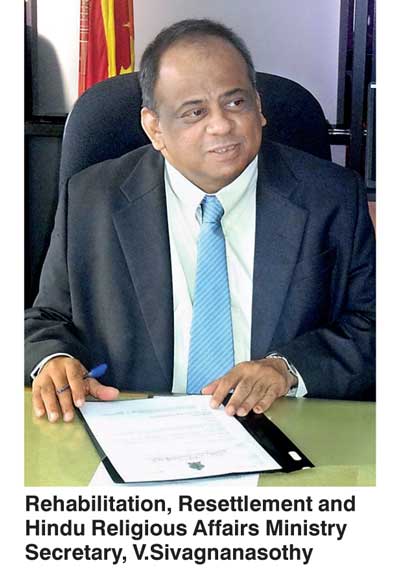Saturday Feb 14, 2026
Saturday Feb 14, 2026
Wednesday, 14 September 2016 00:11 - - {{hitsCtrl.values.hits}}
 Cabinet at its meeting held 30 August granted approval for the appointment of the Task Force on Legal and Judicial Causes of Prisons Overcrowding. The objective of this Task Force is to submit proposals including amendments to existing laws and procedures to reduce prisons overcrowding with a view to transform prisons into rehabilitation centres or correction centres. This Task Force is co-chaired by the Secretary, Ministry of Prison Reforms, Rehabilitation, Resettlement and Hindu Religious Affairs and the Secretary, Ministry of Justice according to Prison Reforms, Rehabilitation, Resettlement and Hindu Religious Affairs Ministry Secretary, V.Sivagnanasothy.
Cabinet at its meeting held 30 August granted approval for the appointment of the Task Force on Legal and Judicial Causes of Prisons Overcrowding. The objective of this Task Force is to submit proposals including amendments to existing laws and procedures to reduce prisons overcrowding with a view to transform prisons into rehabilitation centres or correction centres. This Task Force is co-chaired by the Secretary, Ministry of Prison Reforms, Rehabilitation, Resettlement and Hindu Religious Affairs and the Secretary, Ministry of Justice according to Prison Reforms, Rehabilitation, Resettlement and Hindu Religious Affairs Ministry Secretary, V.Sivagnanasothy.
In this regard, a joint Cabinet Memorandum was submitted by Minister of Justice Wiyajadasa Rajapakse and Minister of Prison Reforms, Rehabilitation, Resettlement and Hindu Religious Affairs D.M.Swaminathan. The Task Force comprises of representatives from Judicial Service Commission, the Attorney General’s Department, the Department of Government Analyst, the Department of Community Based Correction, the Department of Legal Draftsmen, the Department of Police, Department of Prisons, and the Legal Aid Commission, the Judges Training Institute and the Ministry of Law and Order. The Task Force will be facilitated by the ICRC and provide technical and logistic support on international best practices of the prison system and contribute to formulating strategies for prison reforms.
Overcrowding in prisons affects not only the prisoners but also their families and communities at large. To minimise the overcrowding in prisons, steps must be taken to reduce the current populations in prison. A National Plan of Action to reduce prisons overcrowding needs to be worked out by the Task Force with timelines, responsibilities , strategies and proposals and submit such proposal for implementation.
The Task Force will analyse the causes of overcrowding and recommend the implementation of measures to ease the congestion in the prisons island-wide. The Task Force will also oversee the prisons reform initiative through which prisons are shifted from commercial areas to interior areas to reduce overcrowding. The Task Force is also mandated to ensure Sri Lanka complies with the Standard Minimum Rules of Treatment of Prisoners (Mandela’s Rule) and other national and international standards while assisting criminal justice system to reach its ultimate goal of reformation of offenders in order to safeguard society from crime said the Ministry Secretary.
More than 50% prisoners in Sri Lanka have ended-up behind the bars for drug abuse and a number of them are repeated offenders. Statistics from the Department of Prison’s indicate that there are over eighteen thousand inmates across all prisons. Of these, 8100 are convicted offenders and 8500 are remand prisoners. Given the fact the bulk of the prisoners come from the poor uneducated families, they need to be trained before reintegration into the society. Hence, vocational training is important to ensure employment with marketable skills while counselling, spiritual education and psycho-socio orientation are vital to reduce repeated offenders. Unemployed ex-offenders are likely to be repeat offenders as compared to those who have acquired marketable skills.
The Task Force also look into the aspects such as improving health services, safe drinking water and sanitation, promotes international humanitarian laws, improving the family visits, and improving the infrastructure facilities. The Task Force while focusing on the overcrowding issue to address the prison population growth, the public expenditure on prison and more importantly public safety outcomes including prevention of reoffending-overall less crime. The rehabilitated offenders will be better prepared to resume life as good family members, good parents, good neighbours and good citizens.
The Task Force is appointed on the principle that punishment alone is not the solution to crimes. Sentencing and imprisonment is expensive but yet necessary in some cases. Therefore, the criminal justice community must develop practices that reduce costs without sacrificing public safety. Correctional facilities and practices are said to be more effective to successfully integrate offenders into society rather than punishment oriented prisons. It is also noted that the prison inmates include wide variety of criminal offenders with minor offenders/ major offenders, short/long stay, sentenced and un-sentenced, probation/parole, male/ female, mentally ill and drug victims and some of these varieties need to be classified and kept separately to achieve prison objectives. The prisons Task Force will look at overcrowding issues, facilities, treatment, human rights, reform initiatives, correctional aspects and public safety related matters said Ministry of Prison Reforms, Rehabilitation, Resettlement and Hindu Religious Affairs Secretary, V.Sivagnanasothy.